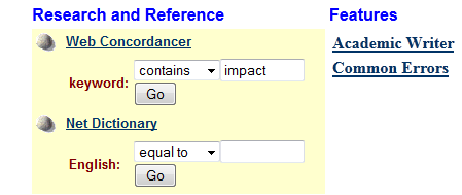Collocations
Some words tend to occur naturally and frequently together. They are "word partners" or collocations. Paraphrasing at the word-level involves looking at the word in context and how it co-occurs or collocates with other words. For example, we say tall girl, tall building BUT NOT *tall wall. attend school, attend a meeting BUT NOT *attend a library
|
Collocations often fall into simple patterns:
verb + noun (e.g. reverse a trend, follow a trend, observe a trend)
noun + noun (e.g. labour shortage, labour market, minority groups, circuit switch)
noun + preposition (majority of, impact on, connection with)
adjective + preposition (capable of, responsible for, involved in)
verb + preposition (apply for, contribute to, revolve around)
![]() Collocation practice
Collocation practice
1 Drag the appropriate nouns that collocate best with the preceding verbs. If the collocation is correct, the noun will stay in place.
2. have
3. make
|
|
2. Drag a suitable word from the left that can regularly occur with each list of words on the right: a. b. c. d e f. |
3. Drag the most appropriate word that collocates best with the word in italics from the options given.
b. Sibling
c. In spite of advances in technology, we are still at risk from natural
d. Following the rise in violence, the government imposed
e. Most economists believe that high taxes inhibit
f. Most universities require international students to have an IELTS score of at least a 6 as a minimum
g. In order to produce new medicines, drug companies have to devote
(Sentences adapted from Porter, D. (2008). Check your vocabulary for academic English. Oxofrd: Macmillan)
|
|
4 Verb + preposition collocations Drag the correct preposition on the left that collocates best with the word in italics in each of the following sentences. Consult a dictionary if necessary. a. The decision by Japanese companies to invest in the UK was contingent b. It is almost impossible to legislate c.Through the internet, students now have access d. Ear plugs and other protective devices can diminish the impact of loud noise e. A lot of money has been channelled f. The drop in oil prices was completely offset g. People have different capacities h. Moths are capable i. The fee is low, compared j. The estate was divided (Sentences adapted from Porter, D. (2008). Check your vocabulary for academic English. Oxofrd: Macmillan) |
![]() Some useful resources for collocation practice:
Some useful resources for collocation practice:
- Dictionaries: A good one like Collins Cobuild English Language Dictionary gives information about how a word is used in different contexts.
- Concordances: A concordance is a useful way of seeing common collocates of a word or phrase. A very simple one to use is the VLC Web Concordancer, hosted by the Polytechnic University of Hong Kong. The easiest way to access this resource, and to avoid server problems, is to google it. Type 'VLC web concordancer' in the google search box. On the first results page, click on the second entry 'Virtual Language Centre'. This opens the 'Research and Reference' page:

To start your search, go to 'Web Concordancer'. Select one of four options from the drop-down menu (equals to, starts with, ends with, contains), type in your keyword and click 'Go'.
In this example, we have selected 'contains' from the drop-down menu, and our keyword is 'impact'.
The figure below is a section of the search results page showing instances of the word impact with collocations to its left and right (articles, adjectives, and prepositions):

- Click here for another concordance website that you might like to browse. This concordance allows you to type in a word and view all instances of the word with its 'word partners' or collocations. It also has very useful information about word families.
- Some reference books at ELE on campus:
Schmitt, D. & Schimitt, N. (2005). Focus on vocabulary: mastering the academic word list. NY: Pearson Education.
Porter, D. (2008). Check your vocabulary for academic English. Oxford: Macmillan Education.





